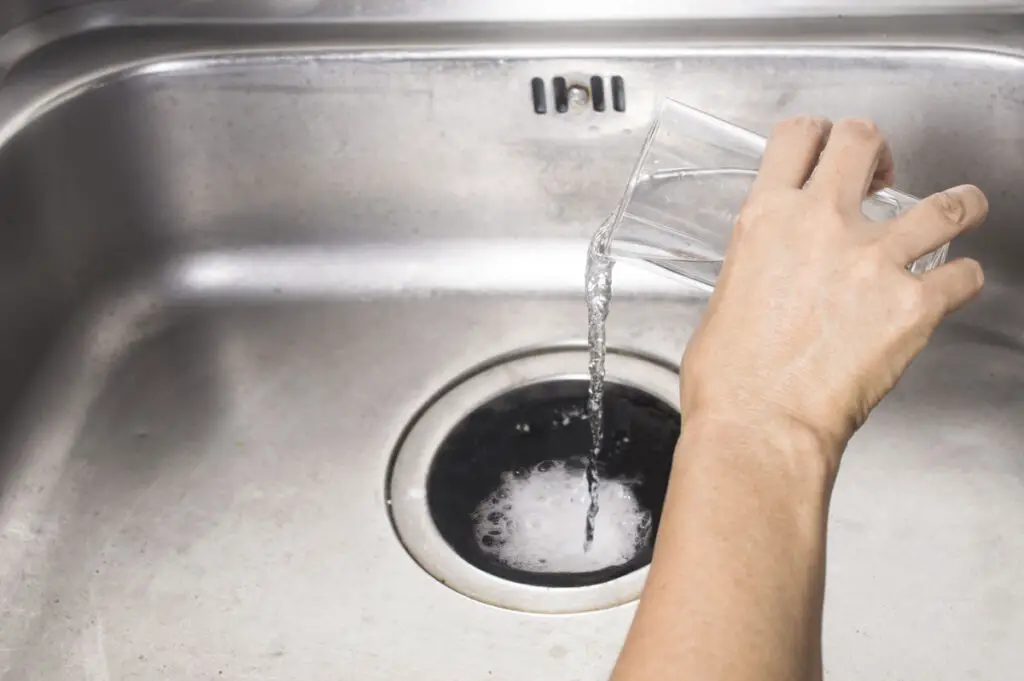Pouring salt down the kitchen drain is an age-old practice that many swear by for maintaining clean and clear pipes. This seemingly simple act is often touted for its numerous benefits, from clearing blockages to eliminating odors. In this article, we’ll delve into the reasons behind this practice, exploring its effectiveness and the science behind why it works.
Natural Cleaning Agent
Salt, particularly in its coarse or rock form, acts as a natural abrasive. When poured down the drain, it can help dislodge and scrub away residue and buildup from food particles, grease, and other substances that commonly clog kitchen drains. This abrasive action makes salt an excellent first line of defense against minor blockages, potentially saving homeowners from more complicated and costly plumbing issues.
Anti-bacterial Properties
Salt is known for its antibacterial properties. It creates an environment that is inhospitable to many types of bacteria that can thrive in the moist, nutrient-rich conditions found in kitchen drains. By pouring salt down the drain, you can help to inhibit bacterial growth, which not only keeps the pipes cleaner but also helps to eliminate unpleasant odors that are often a byproduct of bacterial decomposition.
Cost-Effective and Eco-Friendly
Using salt as a drain cleaner offers a cost-effective alternative to chemical drain cleaners. It’s a substance most people already have in their kitchen, eliminating the need for a trip to the store or the purchase of specialized products. Additionally, salt does not harm the environment in the way that many chemical cleaners can. It breaks down naturally, ensuring that your plumbing maintenance routine has a minimal ecological footprint.
How to Use Salt in Your Drain
To harness the benefits of salt for your kitchen drain, follow these simple steps:
Boiling Water: Start by boiling a pot of water. The heat from the water will soften the grease and grime in your drain, making it easier for the salt to do its job.
Pour Salt: Once the water is boiling, pour a half cup of coarse salt down the drain.
Follow with Boiling Water: Immediately follow the salt with the boiling water. The combination of heat and salt will work together to break down the blockages.
Let It Sit: Allow the mixture to sit in the drain for a few minutes to maximize its cleaning and antibacterial effects.
Rinse Thoroughly: Finally, flush the drain with plenty of hot water to ensure that all debris has been cleared away.
Precautions and Considerations
While pouring salt down the kitchen drain can be beneficial, it’s important to use this method judiciously. Overuse can potentially lead to corrosion in certain types of plumbing, especially in older pipes or fixtures made from less durable materials. It’s also worth noting that while salt can be effective for minor blockages and maintenance, it’s not a cure-all for severe plumbing issues. In cases of significant blockages, it’s best to consult a professional plumber.
Pouring salt down the kitchen drain is a practice rooted in practical benefits, from its natural cleaning properties to its antibacterial effects. By incorporating this simple, eco-friendly method into your kitchen maintenance routine, you can help keep your drains clear and odor-free. However, remember to use it as part of a broader approach to drain maintenance and not as a substitute for professional plumbing services when needed.
Enhancing Salt’s Effectiveness with Baking Soda and Vinegar
For those looking to amplify the effectiveness of salt in cleaning their kitchen drains, combining it with baking soda and vinegar can create a potent natural cleaning solution. This combination leverages the chemical reaction between baking soda (a base) and vinegar (an acid) to create a fizzing action that helps to dislodge blockages and scour the insides of pipes. Here’s how you can use this powerful trio:
Combine Ingredients: Pour a half cup of baking soda down the drain, followed by a half cup of salt. Let this dry mixture sit in the drain for a few hours or overnight to absorb and break down the grime.
Add Vinegar: Pour a cup of vinegar into the drain. The reaction between the vinegar and baking soda will create a fizzing action that helps to break up blockages.
Flush with Boiling Water: After allowing the mixture to work for about an hour, follow up with a kettle of boiling water to flush out the loosened debris and leave your drain clear and fresh-smelling.
Regular Maintenance is Key
Regular maintenance is crucial to preventing blockages and ensuring your kitchen drain remains clean and functional. Incorporating salt, either alone or in combination with baking soda and vinegar, into your routine maintenance can prevent the accumulation of debris that leads to blockages and odors.
It’s a good practice to perform this cleaning method once a month to maintain the health of your drains.
The Limitations of Salt in Drain Cleaning
While salt is a useful tool in the home cleaning arsenal, it’s important to recognize its limitations. For instance, salt cannot dissolve large or solid objects that might be causing blockages. Additionally, if your plumbing system is connected to a septic tank, excessive use of salt can disrupt the balance of bacteria necessary for the septic system to function properly.
Professional Assessment is Sometimes Necessary
Despite your best efforts with salt and other home remedies, some drain issues may persist, indicating a more serious problem that requires professional attention. If you experience recurring blockages, slow draining, or other plumbing issues that home remedies can’t resolve, it’s important to contact a professional plumber. They can provide a thorough assessment and address any underlying issues that may be contributing to your drain problems.
Pouring salt down the kitchen drain, especially when combined with boiling water, baking soda, and vinegar, can be an effective, eco-friendly, and cost-effective method for maintaining clear and odor-free drains. This practice, rooted in simplicity, taps into the natural cleaning and antibacterial properties of salt. However, it’s important to use this method as part of a broader approach to drain maintenance, recognizing its limitations and when to seek professional advice. With regular care and the right techniques, you can ensure your kitchen drains remain in good working order.
FAQ: Using Salt for Kitchen Drain Maintenance
Can I use table salt instead of coarse salt for cleaning my drain?
Yes, you can use table salt, but coarse or rock salt is often recommended because its larger crystals are more effective at scrubbing and dislodging debris inside the pipes. However, table salt can still offer antibacterial properties and help with minor blockages.
How often should I pour salt down my drain?
For regular maintenance, using salt (alone or with baking soda and vinegar) once a month is generally sufficient. If you have a disposal or use your kitchen sink heavily, you might consider increasing the frequency to twice a month to prevent build-up and odors.
Will salt damage my pipes?
In moderation, salt is not likely to damage your pipes, especially modern plumbing systems made of PVC or copper. However, excessive use of salt, especially in older, metal pipes, could potentially lead to corrosion over time. It’s important to use this method judiciously and ensure you flush your drains thoroughly with water after using salt.
Can salt clear a completely clogged drain?
Salt is more effective for maintenance and minor clogs rather than resolving severe blockages. If your drain is completely clogged, salt alone may not be sufficient to clear it, and you might need to use a plunger, drain snake, or seek professional help.
Is it safe to use salt in drains connected to a septic system?
In small quantities, salt should not harm a septic system, but excessive use could disrupt the bacterial balance necessary for the septic process. If you have a septic system, it’s advisable to use salt sparingly and consider septic-safe alternatives for drain maintenance.
Can I use salt to clean my garbage disposal?
Yes, salt can help clean and deodorize your garbage disposal. Grinding ice cubes sprinkled with coarse salt in your garbage disposal can effectively clean the blades and remove built-up residue. Follow this with cold water and a half cup of vinegar to refresh and disinfect the disposal.
Are there any environmental concerns with using salt for drain cleaning?
Salt is a natural and environmentally friendly option compared to chemical drain cleaners. It breaks down naturally and doesn’t contain harmful chemicals that can leach into waterways. However, as with any substance, using it in excessive amounts could contribute to environmental issues, so it’s important to use it responsibly.
What should I do if salt doesn’t clear my drain?
If salt, along with boiling water, baking soda, and vinegar, doesn’t resolve your drain issues, you may be dealing with a more significant blockage that requires mechanical removal. At this point, consider using a plunger, drain snake, or contacting a professional plumber to address the problem safely and effectively.




